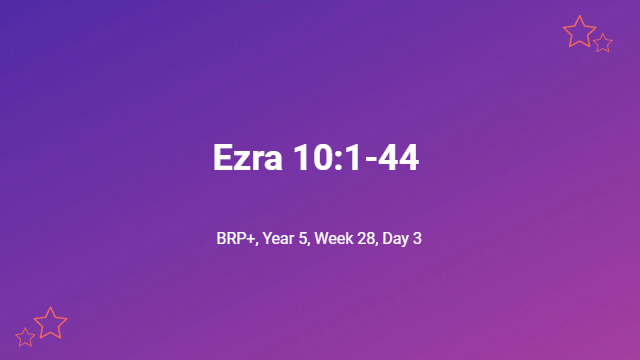Ezra 10:1-44
Q.1. What impact did Ezra’s contrition have on the people? What decision did they make regarding their foreign wives and children? – (Ezra 10:1-4)
The fervency of Ezra’s pleadings drew a crowd of likeminded men, women, and children, who wept bitterly (Ezra 10:1). One of the leading men proposed a way out of the dilemma – 3“So now let us make a covenant with our God to put away all the wives and their children, according to the counsel of my lord and of those who tremble at the commandment of our God; and let it be done according to the law. 4 “Arise! For this matter is your responsibility, but we will be with you; be courageous and act.” (Ezra 10:3-4). This spokesman encouraged Ezra to lead the nation back to God, and to correct this sin that had placed the nation in jeopardy of God’s chastening rod.
Q.2. What steps did Ezra propose to solve this complex issue? What was the starting point to avert God’s judgment? – (Ezra 10:5-15)
Ezra the scribe began with the priesthood. He extracted a solemn oath from these leaders, that they would stand with him to apply the proposed covenant (Ezra 10:5-6). With this unified leadership – They made a proclamation throughout Judah and Jerusalem to all the exiles, that they should assemble at Jerusalem (Ezra 10:7). Refusal to gather in three days was punishable by the forfeiture of their possessions, and excommunication from the assembly (Ezra 10:8 … those who opposed this action were likely dis-fellowshipped – (Ezra 10:15). What started with a representative group of penitent people, spread to a large assembly of trembling people (Ezra 10:9). They sought action – until the fierce anger of our God on account of this matter is turned away from us (Ezra 10:14). The starting point to correct this sin was to – … make confession to the LORD God of your fathers and do His will; and separate yourselves from the peoples of the land and from the foreign wives (Ezra 10:11). The people agreed, but it was acknowledged this was a complex issue that had unfolded over some 80 years since the decree of Cyrus to return to the Promised Land (Ezra 10:12-13).
Q.3. How was the problem of foreign wives resolved? How thoroughly was the matter dealt with and why? – (Ezra 10:14-44)
They decided to delegate this complicated matter involving husbands, wives, children, and grandparents to the heads of the families (Ezra 10:14 & 16). It took many months to resolve all the circumstances relating to the intermarrying with foreign wives (Ezra 10:16-17). The list of names given in verses 18-43 show the earnestness with which God’s people tried to correct the sins of the past. This included the offerings made to satisfy God’s commands. The names were likely added because these people were ‘signatories’ to a solemn vow and covenant (Ezra 10:44 c.f. 10:3).

